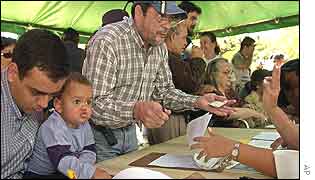| NEWS | SPORT | WEATHER | WORLD SERVICE | A-Z INDEX | ||||||||
|
| You are in:Americas | |||||||||||||||||||||||||||||||||||||||||||||||||||||||||||||||||||||||||||||||||||||||||||||||||||||||||||||||||||||||||||||||||||||||||||||||||||||||||||||||||||||||||||||||||||||||||||||||||||||||||||||||||||||||
|
Monday, 3 February, 2003, 03:17 GMT
Chavez claims strike victory

Critics are now turning to an anti-government petition
Venezuela's President
Hugo Chavez has proclaimed victory over the participants of a 63-day
strike against the government which is being scaled back in the face of
weakening support.
"Today is a victorious day," Chavez said in his weekly broadcast on Sunday, following the announcement by opposition leaders that they were allowing some businesses to begin opening for restricted hours. But the opposition stressed that its struggle against the president was simply "entering a new phase". National petition "We have beaten once and for all a new destabilising attempt, a new malevolent and criminal attempt to sink Venezuela," Mr Chavez said. But in a new offensive against the president, hundreds of thousands of his critics signed a petition on Sunday calling for early elections following the failure to oust him through the national strike. Under the country's constitution, opposition leaders would be permitted to make the request if they secured the signatures of 15% of Venezuela's registered voters - approximately 1.8 million people. It was not clear how many people had signed it so far. Meanwhile, shops, businesses, banks and schools are all resuming normal operations, although the return to work will not include thousands of oil workers who have decided to continue their strike until Mr Chavez calls elections. Oil prices World crude oil prices have spiralled to two-year highs since the strike began in the world's fifth largest oil exporting country. However Mr Chavez claimed oil production was rising to about two-thirds of pre-strike levels, and oil workers, though estimating output at lower than that, acknowledged it was rising. Explaining what had brought about the change of tactics, Jesus Torrealba, executive secretary of the opposition co-ordinating committee has said: "The national strike has reached its objectives and the protest is entering a new phase." But experts say the strike had begun to falter as many companies, faced with bankruptcy, re-opened for business. The strikes, which began on 2 December, have forced Venezuelans to queue for cash, food and gas, and sparked angry protests in which at least seven people have been killed. |
See also:
02 Feb 03|Americas
30 Jan 03|Business
30 Jan 03|Media reports
28 Jan 03|Business
27 Jan 03|Americas
Internet links:
The BBC is not responsible for the content of external internet sites Top Americas stories now:
Links to more Americas stories are at the foot of the page.
|
|||||||||||||||||||||||||||||||||||||||||||||||||||||||||||||||||||||||||||||||||||||||||||||||||||||||||||||||||||||||||||||||||||||||||||||||||||||||||||||||||||||||||||||||||||||||||||||||||||||||||||||||||||||
|
Links to more Americas stories |
 |
||
| ----------------------------------------------------------------------------------
To BBC Sport>> | To BBC Weather>> | To BBC World Service>> ---------------------------------------------------------------------------------- MMIII | News Sources | Privacy |